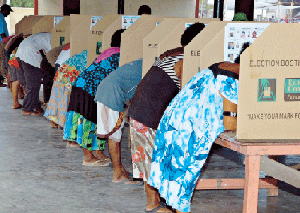
OPINION: PORT MORESBY (PNG Post-Courier Editorial / Pacific Media Watch): How do the foreign media see Papua New Guinea during elections? For answers, let’s talk to Andrew Thomas, Al Jazeera’s roving correspondent based in Sydney, Australia. This is what he says:
“The whole country does not vote at once. Elections take place over two weeks: one area voting the day after another.
“The paraphernalia of the election – ballot boxes, voting slips, police and security officers – moves around the country like a series of travelling circuses of democracy.
“Parties don’t really exist the way they’re understood elsewhere either. They’re brands rather than platforms. Characters count more than policies.
“All of which leaves the question of who might become Papua New Guinea’s next prime minister very much in the air. It may be that another winning candidate emerges altogether.
“Whoever ends up in the top job has big tasks ahead on just about every social indicator. PNG ranks low. In fact, appallingly low given the potential of the country and its recent history – on paper – of economic growth.
“Mining natural resources have brought billions of dollars into state coffers. And yet little has filtered down to schools, hospitals or infrastructure projects.
“Political campaigning in PNG takes place by air – not because it’s glamorous, but because that’s the only way between the big towns. The rugged country has precious few roads.
“The biggest financial boon/boom of all – in fact – is right around the corner. A massive Liquefied Natural Gas project is due to come on stream in 2014. It should bring $16 billion into the country.”
Whoever is in power will manage it.
Thousands turn out in capital for polls
This work is licensed under a Creative Commons Attribution-NonCommercial 3.0 New Zealand Licence.




